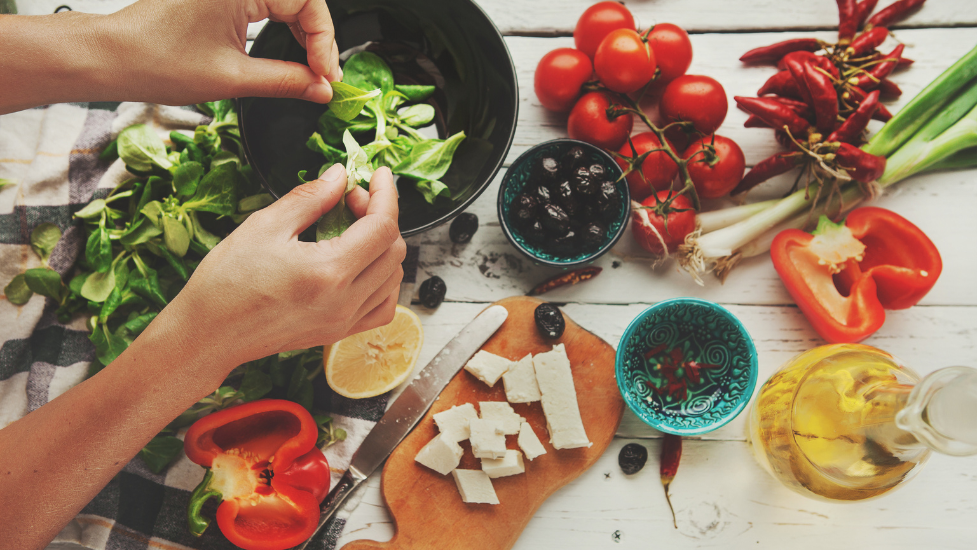Welfare
Eating for exams
Exams are looming and we will all shortly be in brain overload! Record cards, corkboards, exercise books, revision plans, mock tests and lots of sticky notes jostle for space, and while everyone's capacity for learning is different, you can ensure your brain is ready to absorb all that information with a diet packed with brain-boosting foods.
Late nights, stress, missed meals and quick food fixes will all play havoc with your ability to concentrate, absorb information and function properly. So, if you're in the midst of a revision frenzy, follow our foodie advice for making the most of your mind
1. Keep calm
No matter how close your test is, try to keep calm. Stress can have an adverse effect on your appetite and skipping meals won't do your concentration any favours. Discover our top diet and lifestyle tips to help manage your stress levels.
2. Eat regularly
Despite the ongoing debate around the benefits or risks of intermittent fasting, while revising, it's best to eat regularly. Fill up at breakfast on slow-release oats for energy and eggs – they contain a nutrient called choline that's thought to improve cognitive performance and memory as we age. For lunch, eat foods with a low glycemic index to keep you going until dinner. And, for your last meal of the day, enjoy some oily fish, especially salmon – it's a great source of omega-3 fatty acids, has many health benefits and is believed to help support brain function. Not a fish fan? Try some chia seeds or flaxseeds, believed to be the best vegetarian source of omega-3 fatty acids.
3. Stay hydrated
Water allows many of the chemical reactions in our bodies to take place, so the speed at which our brains work and can process information can be affected if we become dehydrated. The NHS recommends we drink around 1.2 litres (or six to eight glasses) of fluid a day, and that most of it is water.
Find out how much water to drink a day.
4. Eat for energy
Tempted to reach for something sweet to get you through the afternoon? Prepare some tasty snacks to munch while you're working instead. The temporary high you'll get from sugar will be quickly followed by a crash in blood sugar levels, which causes fatigue.

Opt instead for healthy snacks like dried fruit nuggets or melon bran pots, or enjoy blueberries, blackcurrants and other berries – they're full of vitamin C, which is thought to improve mental agility. Vitamin E and zinc are also thought to have a positive impact on the brain, so have a handful of pumpkin seeds or walnuts alongside the berries the next time hunger strikes.
Try these 10 healthy snacks you can make in minutes.
5. Food heroes
From wholegrains and seeds to tomatoes and sage, make sure you're au fait with brain-boosting foods by reading through our top 10.
6. Get enough sleep
Lack of sleep will make revising much more difficult, and you'll be much more likely to reach for a sugary fix to get through the learning lulls.
Warm milk and herbal teas before bed have a sedative effect, while a carb-rich snack an hour or so before you head upstairs will clear the way for sleep-inducing amino acids to reach the brain. Read our sleep well feature for more suggestions to help you nod off.
Ditch your phone, tablet or laptop at least 30 minutes before bed. This will help to stop the release of dopamine and get your body ready for sleep. If you must use your phone or tablet before bed, make sure it's set to 'night shift mode', and avoid taking your tablet or phone to bed with you. Rather than using your phone as an alarm, try an old-fashioned alarm clock – this way, you won't be disturbed by incoming messages or tempted to go online if you wake up in the night.
7. Support your immune system
If you've been suffering from stress or sleepless nights or had a poor diet during revision, your immune system will likely need a helping hand. Avoid having your hard work scuppered by a cold or worse by filling your plate with fruit, veg and wholegrains.
Topics
- Read Next
-
 Badminton (Relaxed) Tournament Round TWO - 5th May
Badminton (Relaxed) Tournament Round TWO - 5th May
 Outdoor Games - 9th May
Outdoor Games - 9th May
 Film Night, Flowers of the Killer Moon - 10th May
Film Night, Flowers of the Killer Moon - 10th May
 Summer Work in Accommodation Services
Summer Work in Accommodation Services
 Craft Club (GL) - Crochet and Knitting, 8th May
Craft Club (GL) - Crochet and Knitting, 8th May
 Student Games - 1st May
Student Games - 1st May
 Reflection on leaving UWE by 3rd year student Olivia Spithouris
Reflection on leaving UWE by 3rd year student Olivia Spithouris
 Feeling Lonely? You're not Alone
Feeling Lonely? You're not Alone
 Discover MindHarp - 29th April Bower & 30th April Frenchay
Discover MindHarp - 29th April Bower & 30th April Frenchay
 Badminton (Relaxed) Tournament - 28th April
Badminton (Relaxed) Tournament - 28th April
- Popular
-
 Overnight Visitor Policy
Overnight Visitor Policy
 Student Village | Post and Parcels
Student Village | Post and Parcels
 Bristol Guide: International Supermarkets
Bristol Guide: International Supermarkets
 Accommodation Customer Services Desks
Accommodation Customer Services Desks
 Glenside & The Hollies | Local Area Guide
Glenside & The Hollies | Local Area Guide
 How to do your laundry at UWE
How to do your laundry at UWE
 UWE campus maps
UWE campus maps
 Nearby shopping and amenities for students living on Campus
Nearby shopping and amenities for students living on Campus
 Bringing your bike to Campus?
Bringing your bike to Campus?
 20 Essential apps for life in Bristol
20 Essential apps for life in Bristol




